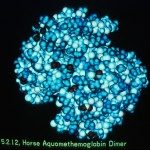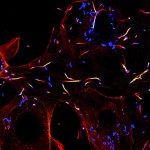Lien vers Pubmed [PMID] – 19018092
Blood 2009 Apr;113(16):3716-25
Distinct genes encode 6 human receptors for IgG (hFcgammaRs), 3 of which have 2 or 3 polymorphic variants. The specificity and affinity of individual hFcgammaRs for the 4 human IgG subclasses is unknown. This information is critical for antibody-based immunotherapy which has been increasingly used in the clinics. We investigated the binding of polyclonal and monoclonal IgG1, IgG2, IgG3, and IgG4 to FcgammaRI; FcgammaRIIA, IIB, and IIC; FcgammaRIIIA and IIIB; and all known polymorphic variants. Wild-type and low-fucosylated IgG1 anti-CD20 and anti-RhD mAbs were also examined. We found that (1) IgG1 and IgG3 bind to all hFcgammaRs; (2) IgG2 bind not only to FcgammaRIIA(H131), but also, with a lower affinity, to FcgammaRIIA(R131) and FcgammaRIIIA(V158); (3) IgG4 bind to FcgammaRI, FcgammaRIIA, IIB and IIC and FcgammaRIIIA(V158); and (4) the inhibitory receptor FcgammaRIIB has a lower affinity for IgG1, IgG2, and IgG3 than all other hFcgammaRs. We also identified parameters that determine the specificity and affinity of hFcgammaRs for IgG subclasses. These results document how hFcgammaR specificity and affinity may account for the biological activities of antibodies. They therefore highlight the role of specific hFcgammaRs in the therapeutic and pathogenic effects of antibodies in disease.



